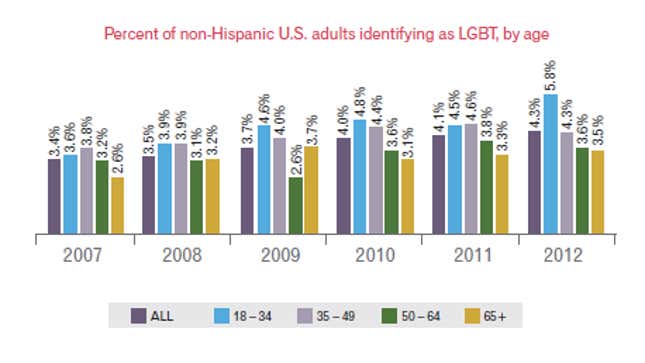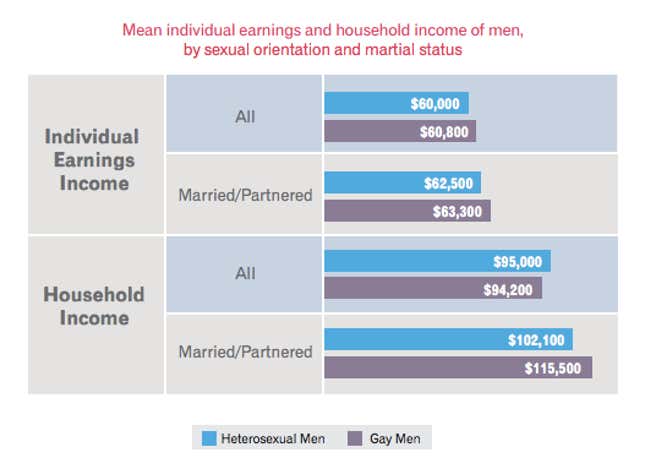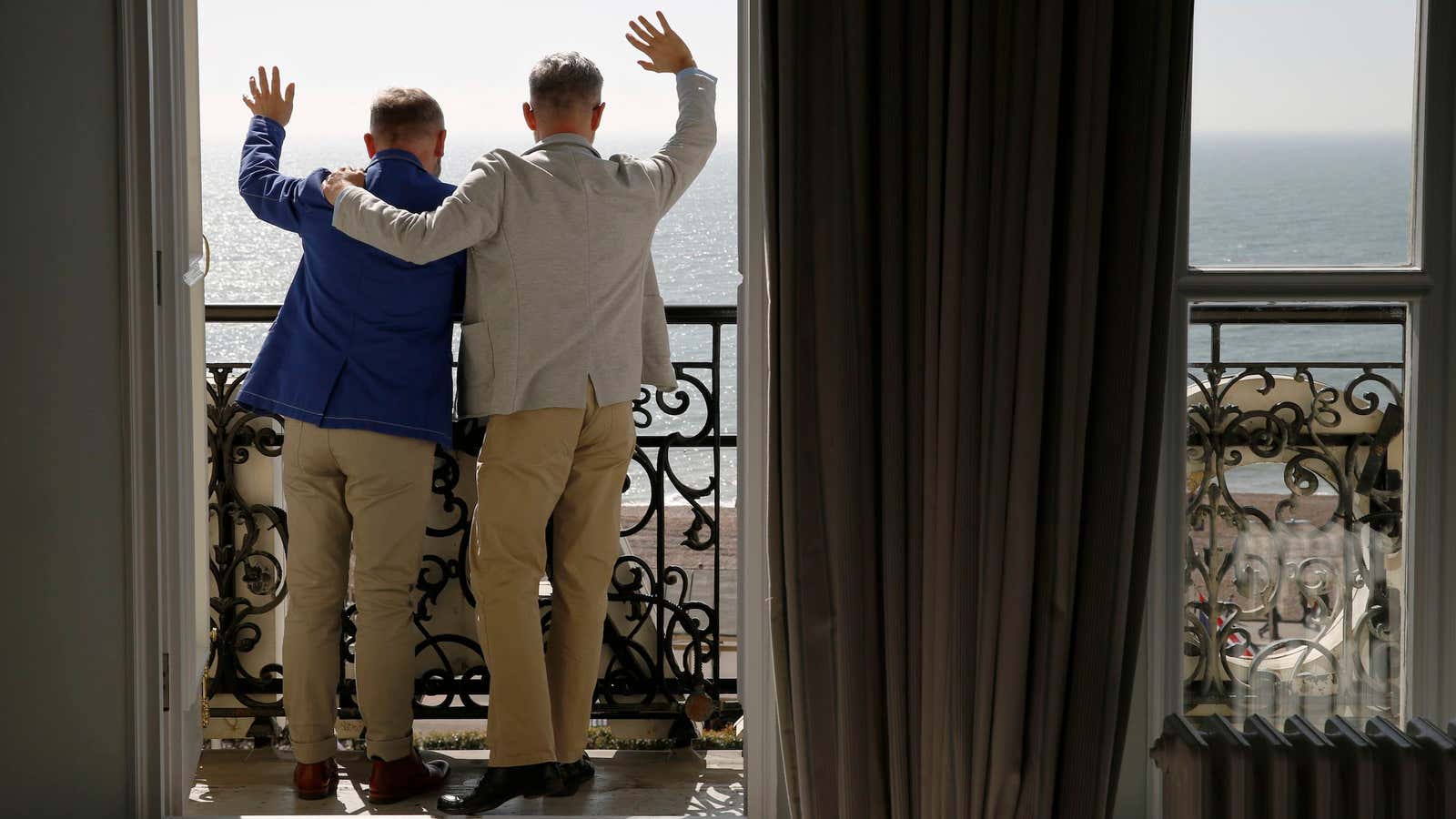Marriott International launched its #LoveTravels marketing campaign on June 2, targeting lesbian, gay, bisexual, and transgender customers—as well as pro-LGBT consumers—with a campaign designed to “convey the company’s commitment to make everyone feel comfortable being who they are.”
The campaign already has its own dedicated website (two of them, actually); hotel-mounted billboards in Washington DC; and is spreading in social and LGBT media. Shot by the photographer Braden Summers, it features the recently out-of-the-closet basketball player Jason Collins and the transgender model Geena Rocero, and invites people to share their stories of travel on social media with the hashtag #LoveTravels. The campaign is timed to attract attention at LGBT Pride celebrations in New York, Washington and San Francisco.
This is just the latest pro-LGBT move by Marriott’s executive director, Bill Marriott, a visible, lifelong Mormon who has professed faith in his church’s teachings—including traditional marriage.
The son of the chain’s founder, J. Willard Marriott (the man that former Republican presidential contender Mitt Romney, whose given name is Willard, was named for), Bill Marriott is not a newcomer to the LGBT rights movement. In fact, he has been a quiet supporter of LGBT rights for more than 25 years. Marriott International began offering benefits for same-sex domestic partners of their American employees in the late 1990s. Since 2007, Marriott has consistently earned high ratings from the Human Rights Campaign (HRC), a leading American LGBT watchdog organization, and the hotel chain joined HRC’s coalition of businesses opposing the federal Defense of Marriage Act, which barred the federal government from recognizing same-sex marriages until it was overturned in 2013 by the Supreme Court. Marriott opposed California’s Proposition 8, which banned same-sex marriage. And a Marriott hotel in Chicago even hosted the “International Mr. Leather Competition,” a leather fetish pageant, in 2012.
When the media questioned Bill Marriott about how he reconciles this stance with his faith, in 2008, Bill Marriott released a statement explaining: ”The Bible that I love teaches me about honesty, integrity and unconditional love for all people,” he said then. “But beyond that, I am very careful about separating my personal faith and beliefs from how we run our business.”
Be that as it may, Marriott’s Mormon faith (and politics) may have factored into the chain’s 2011 decision to remove pay-per-view pornography from the chain’s in-room TV systems. Marriott’s phase-out of porn following a long stint of pressure from Christian organizations was seen as connected to Romney’s presidential campaign (since Romney had been an on-and-off board member and Marriott hotel porn was a thorn in Romney’s side in 2008). But ultimately, the chain attributed the move to the hotels’ inability to compete with adult entertainment on guests’ devices—a claim supported by hospitality market research showing a dip in revenue for in-room pornography.
Why is Bill Marriott so careful to separate faith and business when it comes to LGBT consumers? In a nutshell, $202 billion.
That’s how big the global LGBT travel market is predicted to be this year, up from $181 billion in 2013, according to industry analysts Out Now Global—with LGBT spending comprising 13% of all global travel spending. That 11% rise is more than double (pdf) the increase in world travel spending overall, which is expected to rise 4% to 5% this year. The number of US 18- to 34-year-olds self-identifying as LGBT has risen by more than 60% since 2007 (a 26% increase among all Americans), and married gay men spend 11% more on “nonessential purchases” than their heterosexual counterparts.

The majority of LGBT consumers—over 60% (pdf)—are “brand evangelists” who would recommend brands to others (and even make decisions for their businesses based on perceptions of a brand’s tolerance). That’s ”well above the average” of consumers overall. LGBT customers are also more likely to consider a company’s ideology, with 71% if them willing to pay extra (pdf) if they know they are patronizing a pro-LGBT establishment.
Marriott is not the only player competing for gay travelers—Hilton’s “Go Out” campaign began in 2011. (In fact, the Beverly Hilton is hosting the nuptials of the gay litigants who combatted California’s Proposition 8.) San Francisco’s Kimpton Hotels has been targeting gay consumers since the 1980s. And Starwood’s W Hotels and Westin Resorts have employed staff catering specifically to same-sex couples; the latter’s Hollywood, Florida, location has struck the phrase “bride and groom” from wedding-planning materials. Such marketing moves make sense for any hospitality industry player: The percentage of American gay men who are married has doubled since 2007.
LGBT Americans’ higher average incomes (pdf) and “double income, no kids” households were called a “dream market” by the Wall Street Journal in 1991—a trend that Marriott seems to have understood long before “equality” was a buzzword. Indeed, as Bill Marriott told Businessweek in 2012: ”You’re in business. You’ve got to make money… We have to appeal to the masses out there, no matter what their beliefs are.”

Unlike Dan Cathy, CEO of the fried chicken chain Chick-fil-A, whose public stance against same-sex marriage spawned backlash and boycotts, Bill Marriott won over generations of LGBT customers by taking care to separate the pulpit from the boardroom, and is now reaching out to a new, younger group of LGBT Americans. In doing so, he may manage to capitalize on a market that is growing faster than its heterosexual counterpart.
